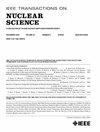在 CSNS Back-n 光束线上测试基于 LGAD 的零度探测器的性能
IF 1.9
3区 工程技术
Q3 ENGINEERING, ELECTRICAL & ELECTRONIC
引用次数: 0
摘要
加速器驱动系统(ADS)技术的发展需要一个全面可靠的中子诱导过程核数据库。虽然已经做了很多努力,但在光束方向零度上对轻质带电离子(如质子、氚和 $\alpha $)的测量精度并不高。大多数探测器无法在高通量中子束的打击下持续工作,因此它们作为零度探测器(ZDD)的应用受到很大限制。最近,低增益雪崩二极管(LGAD)技术的发展满足了ATLAS在大型强子对撞机(LHC)高光度阶段的苛刻要求,它可以在2.5美元/倍;10^{15};1$ MeV $ $后继续工作。\1$ MeV $\text {n}_{text {eq}}\text {cm}^{2}$ 辐照。LGAD 探测器有50- $\mu $ m 的有效厚度、30-ps 的定时分辨率、低成本和良好的辐射硬度特性,有望成为中子诱导过程数据测量中使用 ZDD 的候选器件。本文介绍了 LGAD 探测器在 CSNS 的后向中子(Back-n)光束线上用作 ZDD 时的性能测试。基于对$^{6}\text {Li}(n,{T}) \alpha $的截面测量,结果表明LGAD作为ZDD的性能良好,与评估的核数据文件(ENDF)中的数据一致。本文章由计算机程序翻译,如有差异,请以英文原文为准。
Test of the Performance of an LGAD-Based Zero-Degree Detector on the CSNS Back-n Beamline
A comprehensive and reliable nuclear database of neutron-induced processes is required by the development of accelerator-driven system (ADS) technology. Although many efforts have been made, the measurements of light charged ions (LCIs) (such as proton, tritium, and
$\alpha $
) in zero degree of the beam direction were not conducted with a high accuracy. Most detectors cannot work constantly under the strike of intense flux neutron beam, and thus their application as zero-degree detector (ZDD) is greatly limited. Recently, the low-gain avalanche diode (LGAD) technology has been developed to meet the harsh requirement of the ATLAS on the high-luminosity phase of the Large Hadron Collider (LHC) and could survive after
$2.5 \; \times \; 10^{15} \; 1$
MeV
$\text {n}_{\text {eq}}/\text {cm}^{2}$
irradiation. With its 50-
$\mu $
m active thickness, 30-ps timing resolution, low cost, and good radiation hardness property, the LGAD detector is expected to be a candidate for the use of a ZDD in neutron-induced processes’ data measurements. This article represents a performance test of the LGAD detector when it is used as a ZDD on the back-streaming neutron (Back-n) beamline at CSNS. Based on the measurements of the cross section of
$^{6}\text {Li}(n,{T}) \alpha $
, it shows that the LGAD performs well as a ZDD based on a good agreement with the data from evaluated nuclear data file (ENDF).
求助全文
通过发布文献求助,成功后即可免费获取论文全文。
去求助
来源期刊

IEEE Transactions on Nuclear Science
工程技术-工程:电子与电气
CiteScore
3.70
自引率
27.80%
发文量
314
审稿时长
6.2 months
期刊介绍:
The IEEE Transactions on Nuclear Science is a publication of the IEEE Nuclear and Plasma Sciences Society. It is viewed as the primary source of technical information in many of the areas it covers. As judged by JCR impact factor, TNS consistently ranks in the top five journals in the category of Nuclear Science & Technology. It has one of the higher immediacy indices, indicating that the information it publishes is viewed as timely, and has a relatively long citation half-life, indicating that the published information also is viewed as valuable for a number of years.
The IEEE Transactions on Nuclear Science is published bimonthly. Its scope includes all aspects of the theory and application of nuclear science and engineering. It focuses on instrumentation for the detection and measurement of ionizing radiation; particle accelerators and their controls; nuclear medicine and its application; effects of radiation on materials, components, and systems; reactor instrumentation and controls; and measurement of radiation in space.
 求助内容:
求助内容: 应助结果提醒方式:
应助结果提醒方式:


